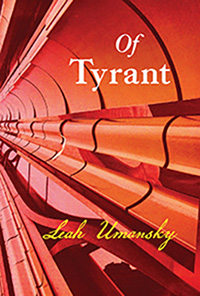Love, Tyrant, Love: A Review of Leah Umansky’s Of Tyrant
Leah Umansky’s third full-length collection, Of Tyrant, continues to explore the twenty-first century cosmopolitan female experience with the same wild intensity and formal inventiveness that readers of her poetry have come to expect. Umansky is a Manhattan poet, firmly grounded in an aesthetic that feels like fourth generation New York School, part Frank O’Hara, if O’Hara’s poetry fused with the linguistic acrobatics of a poet like Rae Armantrout, but also fully original, down-to-earth, and earnest in its lyricism and content. Umansky, like O’Hara, has never been afraid to drink a Coke in a poem; in Of Tyrant, she references and draws inspiration from a Jessica Chastain Saturday Night Live skit, a conversation with a Lyft driver, and Guillermo del Toro’s acceptance speech at the Golden Globes. At the same time, Umansky, like Armantrout, fearlessly dwells in language as it detaches itself from easy narrative, as she does in the poem “[of] Tyrant in Jest,” a variation on anagrammatic poetry, which begins:
Any
Rat
Any
Tat
Any
Ratatatat
The poem continues from there, playfully exploring the sonic architecture of the word tyrant. Umansky’s playfulness and experimentalism nuance the greater project of this collection: to chronicle feminine rage and empowerment in the era of the first Trump administration and #MeToo.

Tyranny and misogyny rhyme exactly in Of Tyrant. In the first stanza of the textbox prose poem “[Of Men],” Umansky writes: “and why is it that everything is built for the hands [of men] and why is so much of today islanding away from us.” This “islanding away” initiates the collection, which begins with a mother and daughter observed on the F Train. The daughter pushes through the crowded train toward her mother in a panic. The mother grabs the daughter’s wrist hard and tells her: “Use your words, honey.” In Umansky’s poem, this ordinary scene becomes a metaphor for the dystopian present, a world contextualized by brutal patriarchal notions deeply embedded in us all. Elsewhere in the collection, Umansky reminds us: “There are so many tyrants around us,” “at your job,” following you home, “in your grief,” “in your longing,” “in your heart,” “on your train,” “in your breath,” and even, and especially, “in this poem.” In Umansky’s telling, it is not simply a despot-in-chief that we need to resist. Certainly, the figure of the forty-fifth president provides the backdrop for this poetry, but his policies are only explicitly acknowledged in the poem “Stay Quiet,” inspired by ICE detaining children on the border in 2018. The poems in this collection call for their readers to examine the ordinary tyrannies that circumscribe our daily lives. Umansky invites us to question in what ways larger political tyrannies and social injustices echo out and are embodied in our familial relationships, in our friendships, in our workplaces, on our commutes, in our communities, and in our own minds and hearts.
“Tyrant as Self Reflection” is the kind of oeuvre-defining poem poets write once in a career; it is an ars poetica of sorts, a parable for the creative act, in which the tyrant is a figure of the artist, and a warning to those whom art turns inward only, at the expense of real life and real people.
Tyrannies of the heart provide the vertebrae for this collection. The shortest poem in the collection, “Love, Tyrant, Love,” asserts a proposition, questions it, and articulates the answer with the sharpness of a Zen koan: “It is always related to love; how can it not be? / Love, Tyrant, Love.” The “It is” here reminds one of William Carlos Williams’s famous “so much” from “The Red Wheelbarrow.” Both opening salvos are ambiguous (what is the “it”? the “so much”?), but stand as metonyms for poetic projects where the rhythms of colloquial speech, in the American grain, contain a staggering expressivity. Umansky’s “it” is poetry, but it is also desire, and it is also tyranny itself. The concluding italicized line might be read as an imperative to the tyrant: to love. It might equally be read as a list of two polarities: “Love” and “Tyrant,” two opposites, two categories, the greater of which, by virtue of repetition, is “Love.”
Perhaps the greatest poem in this collection, the final poem, “Tyrant as Self Reflection,” vibrates with all the tensions between love and the tyrant that have propelled Of Tyrant from its first line. This prose poem uses the conceit of a toxic romantic relationship to crystallize, contain, and exorcize the tyrannies and tyrants—large and small, national and personal, historical and psychological—coursing through the book. The tyrant in this poem is a narcissist: “The tyrant sees himself when he sees you.” Note the italicized “he.” The tyrant is a selfish, broken person, a damaged and damaging lover, someone who is hurt and hurting, but who is also cycling through a kind of erotic solipsism (“When the tyrant sees your love, he sees his love. When the tyrant sees your love, he doesn’t see love, he doesn’t see love, he sees himself.”). In the course of the poem, the tyrant duplicates and butterflies himself. The speaker internalizes and reduplicates the tyrant and his logic in a volcanic tour de force of anaphora. Self and other blur, swap, congeal, bifurcate, dissolve, solidify, converse, and renegotiate through repetition and emphasis. The poem ends with the tyrant mouthing something “to his self” as “he is mounting” himself: “I am you; I am the Tyrant.” “Tyrant as Self Reflection” is the kind of oeuvre-defining poem poets write once in a career; it is an ars poetica of sorts, a parable for the creative act, in which the tyrant is a figure of the artist, and a warning to those whom art turns inward only, at the expense of real life and real people. At the same time, it’s also one of the greatest poems ever written about a bad boyfriend.
Of Tyrant is the kind of book that I need now, at the beginning of the second Trump presidency, more than ever. Leah Umansky’s poetry never fails to amaze me because of the formal risks it takes, its intuitive associational cascading lyricism, its strategic use of narrative, and its rhetorical power. More than that, though, when I read a Leah Umansky poem, I feel the pulse of real pain, true wonder, and a fierce intelligence suspended from every phoneme. Umansky knows how to stay brave, to write through the domestic uncertainties of this barbarous century. She reminds me, “they cannot write this away,” whoever they are, and “the power is always in words,” and most of all, that those of us who read and write and live by poetry have a responsibility to remain tender, to be open, to marvel, to be truth-tellers, to inhabit the music of our saying.
Recommended
A Review of Portable City by Karen Kovacik
A Review of Haircuts for the Dead by William Walsh
A Review of Birdbrains: A Lyrical Guide to the Washington State Birds






